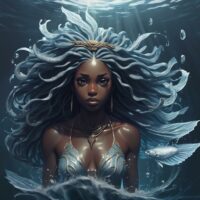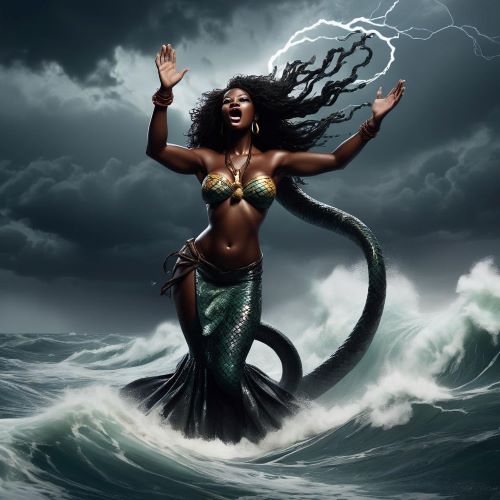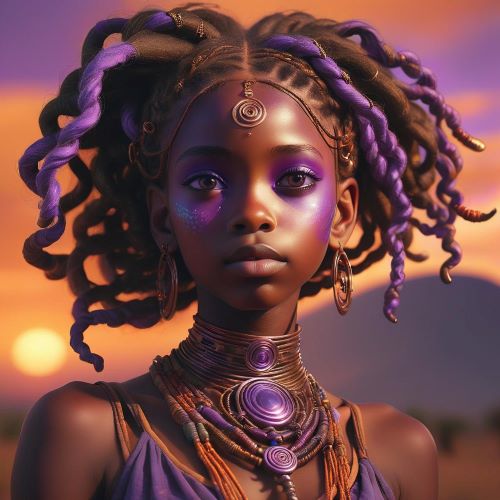
Owu Mmiri : The Water Spirit
Listen
At a glance
| Description | |
|---|---|
| Origin | Igbo Mythology |
| Classification | Spirits |
| Family Members | N/A |
| Region | Nigeria |
| Associated With | Water, Prosperity, Destruction |
Owu Mmiri
Introduction
Owu Mmiri, meaning “water spirit” in Igbo, holds deep cultural and spiritual significance, especially for communities near rivers and other water bodies. In Igbo cosmology, water is a powerful force—both a source of life and a medium for magic and communication. Owu Mmiri reflects this duality, embodying both the nurturing and unpredictable aspects of nature. Revered and sometimes feared, this spirit governs the waters, ensuring their abundance while also wielding their potential for destruction. The myths and traditions surrounding Owu Mmiri offer a glimpse into the Igbo worldview, illustrating their respect for nature and the interconnectedness of the physical and spiritual realms.
Physical Traits
Owu Mmiri is often envisioned as a mermaid-like being, blending human and aquatic traits to symbolize their deep connection to water. Some depictions describe them as a luminous figure with flowing hair and shimmering skin, capturing the brilliance and movement of the waves. Others believe Owu Mmiri takes the form of a white mermaid, reinforcing their mystical presence. Their piercing eyes are said to reflect the ocean’s depths, hinting at hidden wisdom and power. As part of the broader “Mammy Wata” spirit tradition, Owu Mmiri embodies the unpredictable and awe-inspiring forces of nature.
Family
Details about Owu Mmiri’s family in Igbo mythology are not well-documented, but they are often associated with Nne Mmiri, the revered water goddess who governs life’s transitions. Some traditions suggest Owu Mmiri is connected to other water spirits and deities, emphasizing the deep interrelation of natural forces in Igbo beliefs. They may be seen as part of a larger spiritual family that includes elemental beings, reinforcing the idea of balance between earth, fire, air, and water. These connections highlight the Igbo understanding of nature’s harmony and the spiritual forces that shape existence.
Other names
Owu Mmiri is known by various names across different regions of Igboland, reflecting the diversity of Igbo spiritual traditions. One of the most widely recognized names is Mami Wata, a title often associated with water spirits across West Africa. In some areas, Owu Mmiri is also called Uhamiri, emphasizing their mystical connection to rivers and the unseen world. Similarly, Nne Mmiri, the Igbo river goddess, is known by titles such as Idemmili, Ezenwayi, and Nne Oshimmiri, each highlighting unique attributes of the water deity. These variations illustrate the rich and nuanced ways in which Igbo communities honor and interpret their spiritual figures.
Powers and Abilities
Owu Mmiri is the embodiment of all water in the universe, representing both its nurturing and formidable aspects. In Igbo spirituality, water is seen as a feminine force, symbolizing renewal, transformation, and spiritual depth. Practitioners known as Dibịa Owu Mmiri or Olu Mmiri specialize in working with water energies and spirits, particularly Ndi Mmiri, channeling their knowledge to maintain balance between the physical and spiritual worlds. These water spirits are revered for their deep connection to emotion, healing, and creation, making them central to Igbo cosmology.
As a powerful deity, Owu Mmiri possesses abilities that reflect the fluid nature of water. They can control bodies of water, influencing tides, currents, and rainfall to sustain life or signal their presence. Water’s purifying essence also grants them the power to heal, restoring both physical and spiritual well-being. Additionally, Owu Mmiri is associated with fertility and prosperity, ensuring the abundance of crops, livestock, and human life. This connection to growth and nourishment reinforces their role as a life-giver and protector.
However, like water itself, Owu Mmiri has a dual nature. While often benevolent, they can also unleash destructive forces when angered or disrespected. Floods, storms, and other water-related disasters serve as reminders of their immense power. This balance between creation and destruction highlights the Igbo understanding of water as both essential and unpredictable, demanding respect and reverence. Through their myths and worship, Owu Mmiri continues to be a significant figure in Igbo spiritual tradition, embodying the ever-changing yet vital nature of water.
Modern Day Influence
Owu Mmiri’s origins trace back to the belief in Owu Miri, mystical water spirits or fairies deeply embedded in Igbo tradition. Among the Riverine Igbo, the Owu masquerade is a significant festival that blends spiritual reverence with social celebration. These performances honor water spirits and reinforce communal values, playing a crucial role in both religious and cultural life. Through elaborate displays, storytelling, and dance, the festival keeps ancient traditions alive while strengthening the bond between the people and their spiritual heritage.
In modern times, Owu Mmiri’s influence extends beyond religious practice into artistic and cultural expression. Contemporary performances inspired by the Owu masquerade serve as both entertainment and education, preserving Igbo history for new generations. Artists, writers, and musicians frequently draw from Owu Mmiri’s lore, incorporating water symbolism and spiritual themes into their work. These creative interpretations help keep the mythology relevant, bridging the gap between tradition and contemporary life.
The reverence for Owu Mmiri continues today, with many practitioners of traditional Igbo spirituality maintaining rituals and offerings to honor the water spirit. Beyond religious spaces, the figure of Owu Mmiri has found a place in literature, film, and music, reflecting the lasting significance of water in Igbo cosmology. This enduring presence underscores the deep cultural and spiritual connection the Igbo people share with water, ensuring that the legacy of Owu Mmiri remains alive and influential across generations.
Related Images
Source
Oriji, John N. The Igbo People and the City of Onitsha. Edwin Mellen Press, 1995.
Uzoma, Ikechukwu. Igbo Mythology: The Gods of the Igbo. Igbo Books Publishing, 2017.
Eze, Chidi. Rivers, Waters, and the Spirits: A Guide to Igbo Water Deities. Igbo Cultural Studies, 2019.
Igbo History TV. (2024, September 28). The Owu Masquerade: Origin, Cultural Significance, and Spread.
Kindred Stories HTX. (2022, January 4). Igbo Myths/Introduction To Igbo.
Mahogany Books. (2022, February 22). Introduction to Igbo Mythology for Kids: A Fun Collection of Heroes






